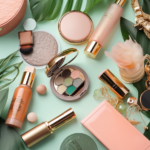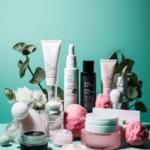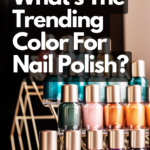Are you curious about the latest trend in natural beauty? Look no further. In this article, we will explore the exciting new phenomenon that has taken the beauty world by storm. With a focus on using organic and sustainable ingredients, this trend is not only good for your skin but also for the environment. So, get ready to discover the must-have products and techniques that will revolutionize your beauty routine.
Clean beauty
Definition of clean beauty
Clean beauty refers to products that are made with safe and non-toxic ingredients, avoiding harmful chemicals commonly found in conventional beauty products. It is a movement that prioritizes the health and well-being of both the consumer and the environment. Clean beauty products are formulated without ingredients like parabens, phthalates, sulfates, and synthetic fragrances, which have been associated with various health concerns.
Benefits of clean beauty
Choosing clean beauty products has several benefits. Firstly, they are gentle and less likely to cause skin irritations or allergic reactions. This is especially important for individuals with sensitive skin or those prone to allergies. Clean beauty products also often contain natural and nourishing ingredients that can improve the overall health and appearance of the skin. Additionally, by opting for clean beauty, you are supporting sustainable and ethical practices and minimizing your impact on the environment.
Popular clean beauty brands
The clean beauty movement has gained significant popularity in recent years, leading to the emergence of numerous brands dedicated to producing safe and sustainable products. Some of the most well-known clean beauty brands include RMS Beauty, Ilia Beauty, Beautycounter, Tata Harper, and Herbivore Botanicals. These brands prioritize transparency, rigorous ingredient sourcing, and the use of non-toxic formulations to ensure the highest quality products for their customers.
Sustainable packaging
Importance of sustainable packaging
Sustainable packaging is crucial in reducing the environmental impact of the beauty industry. Conventional beauty products often come in excessive plastic packaging that contributes to the global plastic waste crisis. Sustainable packaging aims to minimize this waste by using eco-friendly materials and adopting innovative packaging techniques. It is designed to be recyclable, biodegradable, or compostable, taking into account the entire lifecycle of the product.
Eco-friendly packaging materials
Several eco-friendly packaging materials have emerged as alternatives to traditional plastic packaging. These include glass, which is recyclable and reusable, and often offers a more luxurious feel. Another eco-friendly option is aluminum, which is highly recyclable and lightweight, reducing carbon emissions during transportation. Additionally, materials like bamboo, paper, and plant-based plastics are being utilized as sustainable packaging solutions in the beauty industry.
Brands leading the way in sustainable packaging
Many beauty brands are actively taking steps towards sustainable packaging. One notable example is Lush, known for its minimal packaging approach and use of recycled and recyclable materials. Another brand, Aether Beauty, focuses on using recyclable and sustainable packaging materials without compromising on quality and design. In addition, brands like Kjaer Weis and Elate Cosmetics offer refillable packaging options, reducing the need for single-use containers. These brands serve as inspirations for the industry by demonstrating that sustainability can coexist with beauty and luxury.
Waterless beauty
Advantages of waterless beauty
Waterless beauty refers to products that are formulated without the use of water as a primary ingredient. This innovative approach offers several advantages. Firstly, waterless beauty products have a longer shelf life as they are not prone to bacterial growth. Secondly, they are highly concentrated, meaning a little product goes a long way, reducing the need for frequent repurchasing. Additionally, waterless products are more travel-friendly since they are not subject to liquid restrictions, making them convenient for those on the go.
Water-saving products and practices
Embracing waterless beauty is a step towards more responsible water usage. By reducing the demand for water in skincare and haircare products, we can conserve this precious resource. Water-saving products include dry shampoos, solid cleansers, and powdered masks that require little to no water during application. Additionally, practices like embracing shorter showers, collecting and reusing water when possible, and using water-efficient beauty tools contribute to water conservation efforts.
Waterless beauty brands
Numerous brands have recognized the importance of water conservation and have developed innovative waterless beauty products. One such brand is OWA Haircare, which offers waterless hair products like shampoo bars and powder-based products. Another brand, Ethique, specializes in solid beauty bars that eliminate the need for plastic bottles and excess water. These brands demonstrate that waterless beauty can be effective, sustainable, and still provide exceptional results.
Plant-based skincare
Rise of plant-based skincare
Plant-based skincare has seen a significant rise in popularity as more consumers prioritize natural and sustainable beauty solutions. Plant-based products utilize ingredients derived from botanical sources, harnessing the power of nature to nourish and improve the skin. With a focus on botanical extracts, essential oils, and plant-based emollients, plant-based skincare aims to provide effective results while minimizing the use of synthetic chemicals.
Benefits of plant-based ingredients
Plant-based ingredients offer a multitude of benefits for the skin. They are rich in antioxidants, vitamins, and minerals that help rejuvenate and protect the skin from environmental damage. These ingredients often have anti-inflammatory and soothing properties, making them ideal for sensitive or reactive skin types. Plant-based skincare is also more sustainable as it relies on renewable resources and avoids the potential harm associated with certain synthetic chemicals commonly found in conventional products.
Plant-based skincare brands
Many brands have embraced plant-based formulations and are committed to creating effective and sustainable skincare products. One prominent brand is Herbivore Botanicals, known for its clean and plant-based approach to skincare. Another notable brand is Drunk Elephant, which utilizes a range of natural botanical extracts and plant oils in their formulations. Additionally, Tata Harper, Biossance, and Pai Skincare are all renowned for their commitment to plant-based ingredients and their positive impact on both the skin and the environment.
Adaptogens in beauty
Understanding adaptogens
Adaptogens are natural substances that help the body adapt to stress and restore balance. In the beauty industry, adaptogens are increasingly being used in skincare and haircare products for their potential benefits. These powerful botanicals are known for their ability to support the skin’s resilience to daily stressors, promoting a healthier and more radiant complexion.
Use of adaptogens in skincare and haircare
Adaptogens are incorporated into skincare and haircare products to enhance their efficacy and provide additional benefits. They can help calm and soothe irritated skin, reduce redness, and promote a more balanced complexion. In haircare, adaptogens can strengthen the hair follicles, stimulate growth, and improve the overall health of the scalp. By harnessing the power of adaptogens, beauty products can effectively address various skin and hair concerns.
Popular adaptogenic beauty products
Several beauty brands have embraced adaptogens and formulated products that harness their potential benefits. Moon Juice, for example, offers adaptogenic skincare products like serums and masks that promote vibrant and healthy skin. REN Clean Skincare incorporates adaptogens into their products to provide natural protection against environmental stressors. Another brand, Youth To The People, combines adaptogens with other potent ingredients in their skincare line, focusing on delivering results while ensuring the products are clean and sustainable.
CBD-infused products
Introduction to CBD
CBD, short for cannabidiol, is a naturally occurring compound found in the cannabis plant. Unlike THC, another compound found in cannabis, CBD is non-psychoactive and does not produce the “high” associated with marijuana. CBD has gained popularity in the beauty industry due to its potential calming, anti-inflammatory, and moisturizing properties.
Benefits of CBD-infused products
CBD-infused beauty products offer several benefits for the skin. CBD has natural anti-inflammatory properties, making it beneficial for individuals with sensitive or acne-prone skin. It can help soothe redness, reduce inflammation, and promote a calmer complexion. CBD is also rich in antioxidants, which can help protect the skin from environmental stressors, such as pollution and UV damage. Additionally, CBD’s moisturizing properties can provide hydration and nourishment, improving the overall health and appearance of the skin.
CBD beauty brands
Numerous brands have embraced CBD in their beauty formulations, recognizing its potential benefits. Lord Jones is a notable brand that specializes in luxury CBD-infused skincare and body products. Josie Maran offers a range of CBD-infused skincare products, harnessing CBD’s anti-inflammatory properties. Moreover, Cannuka combines CBD with Manuka honey for a unique and nourishing skincare experience. These brands are at the forefront of the CBD movement in beauty, highlighting the versatility and effectiveness of CBD-infused products.
Upcycled ingredients
What are upcycled ingredients
Upcycled ingredients refer to utilizing byproducts or leftover materials that would otherwise go to waste in the production process. Instead of discarding these materials, they are repurposed and transformed into valuable ingredients for beauty products. Through upcycling, the beauty industry can minimize waste and make use of resources that may have otherwise been wasted.
Benefits of upcycled ingredients
Upcycled ingredients offer several benefits for the beauty industry. Firstly, they help reduce waste and decrease the environmental impact of cosmetic production. By repurposing byproducts and leftovers, upcycling contributes to a more sustainable and circular economy. Additionally, upcycled ingredients can often bring unique benefits to beauty products, such as increased hydration or enhanced nourishment, as they contain valuable components that would have otherwise been discarded.
Brands using upcycled ingredients
There are several brands leading the way in incorporating upcycled ingredients into their beauty formulations. UpCircle is one such brand that specializes in creating skincare products from upcycled coffee grounds. They repurpose this waste material to create exfoliators and face masks, providing unique benefits for the skin. Another brand, Rejuiced, uses upcycled fruit waste to create natural and sustainable skincare products. These brands exemplify the potential of upcycled ingredients in the beauty industry, showing that waste can be transformed into valuable resources.
Multifunctional products
Convenience of multifunctional products
Multifunctional beauty products provide convenience and efficiency by combining multiple benefits into a single product. They offer simplicity in skincare routines, reducing the number of products needed without compromising on results. With busy lifestyles, multifunctional products are the perfect solution for those seeking a streamlined beauty routine that still delivers effective and comprehensive care.
Examples of multifunctional beauty items
The beauty industry has seen the rise of various multifunctional products that cater to different skincare needs. BB creams, for instance, combine the benefits of skincare, foundation, and sun protection into one product. This saves time and effort in the morning while providing coverage and skincare benefits throughout the day. Another example is tinted lip balms that provide hydration, color, and SPF protection, eliminating the need for separate lip care and makeup products. Multifunctional products like these simplify beauty regimens, making them more accessible and efficient for individuals of all lifestyles.
Brands focusing on multifunctionality
Brands that prioritize multifunctionality have gained popularity due to their innovative approaches to beauty. One such brand is Glossier, known for its “skin first, makeup second” philosophy. Glossier’s products, like their Boy Brow, serve multiple purposes, simplifying makeup routines while offering skincare benefits. Another brand, Milk Makeup, emphasizes convenience with their range of Stick products that offer easy application and versatile usage. These brands showcase how multifunctionality can enhance the beauty experience and cater to the needs of modern consumers.
Customizable beauty
Personalization in beauty
Customizable beauty allows individuals to tailor skincare and makeup products to their specific needs, preferences, and skin concerns. It recognizes that everyone’s skin is unique and requires a personalized approach. By offering customizable options, beauty brands empower consumers to take control of their beauty routines and cater to their individual preferences.
Benefits of customizable products
Customizable beauty products offer several benefits for consumers. Firstly, they allow individuals to address specific skin concerns and use ingredients that work best for their skin type. This personalized approach can lead to improved results and a more tailored skincare routine. Customizable products also promote individuality and self-expression, allowing consumers to create a beauty routine that reflects their personal style and aesthetic. Lastly, by reducing the need for multiple products that may go unused, customizable options can help minimize waste and promote sustainability.
Brands offering customizable options
Many beauty brands have embraced customization and offer products that cater to individual preferences. One standout brand is Proven Skincare, which uses artificial intelligence and personalized algorithms to create customized skincare regimens based on each customer’s unique needs and concerns. Another brand, Bite Beauty, goes beyond skincare and offers personalized lipstick creation, allowing customers to choose the exact shade and finish they desire. These brands exemplify the power of customization in beauty, empowering consumers to embrace their individuality and create products that align with their specific needs.
Digital beauty experiences
Virtual beauty consultations
Digital beauty experiences have become increasingly popular, offering individuals the opportunity to receive personalized advice and recommendations from beauty experts through virtual consultations. These consultations use video conferencing or online platforms to connect customers with knowledgeable professionals who can assess their skincare needs and suggest personalized solutions.
Augmented reality in beauty
Augmented reality (AR) technology has revolutionized the beauty industry by allowing consumers to virtually try on makeup, experiment with different shades and products, and visualize the end result before making a purchase. AR-enabled apps and online platforms provide a fun and interactive beauty experience, helping individuals make more informed decisions about their beauty purchases.
Online beauty communities
Digital beauty experiences extend beyond virtual consultations and augmented reality. Online beauty communities provide a space for beauty enthusiasts to connect, share experiences, and discuss product recommendations. Social media platforms, beauty forums, and dedicated online communities bring together individuals with a shared passion for beauty, fostering engagement, and learning opportunities.
In conclusion, the beauty industry is undergoing a significant transformation driven by the rise of clean beauty, sustainable packaging, waterless beauty, plant-based skincare, adaptogens, CBD-infused products, upcycled ingredients, multifunctional products, customizable options, and digital beauty experiences. These trends reflect a shift towards more conscious and individualized beauty practices, prioritizing health, sustainability, and personalization. By embracing these trends, consumers can make informed choices that not only benefit their own well-being but also contribute to a more sustainable and inclusive beauty industry.




